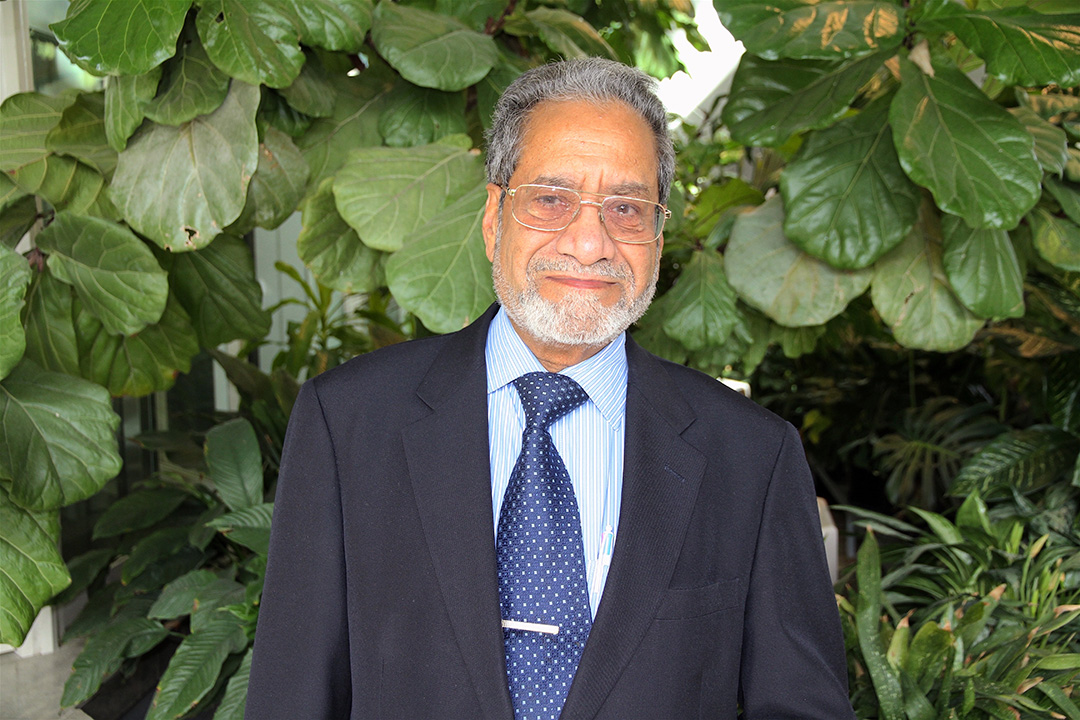
Remarkable tenure for USask AgBio professor
Take a moment to turn back time 50 years to 1969: Pierre Trudeau was prime minister and Justin Trudeau hadn’t been born yet, astronauts landed on the moon for the first time, the Saskatchewan Roughriders lost to the Ottawa Rough Riders in the 57th Grey Cup, and the No.1 song on the charts was “Sugar, Sugar” by The Archies.
By James ShewagaIt was also that year that a bright young agriculture professor taught his first course at the University of Saskatchewan (USask). Half a century later, Dr. Surendra Kulshreshtha (PhD) is still one of the first into the office and one of the last to leave, teaching, researching and mentoring young graduate students in the College of Agriculture and Bioresources.
While he has enjoyed his time on campus, Kulshreshtha never imagined he would still be here at the age of 78.
“If you had asked me that question 20 years ago, I would have said no way!” he said with a smile. “But I enjoy the job and I really like to do my research and talk to graduate students and train them and see them getting somewhere in their life. I look back on my graduate students who have achieved quite a bit and that brings me a lot of satisfaction … And I have a graduate student now who will probably be here until 2021, so until then it is very hard to even think about retirement.”
Officially, Kulshreshtha will celebrate his 50-year anniversary on Dec. 1.
“For me, it will be just like any other day, unless it’s a weekend,” he said with a chuckle.
For the record, Dec. 1 is a Sunday this year, but no doubt he will be back in the office the very next day in the Agriculture Building, a stunning $100-million facility completed in 1991 that Kulshreshtha cites as one of the major changes he has seen on campus during his tenure.
“Now we have all the departments in the same place and that was a good change for everybody,” said Kulshreshtha, who was born in India and earned his bachelor’s and master’s degrees there before moving overseas to complete his PhD at the University of Manitoba.
As for the agriculture industry, Kulshreshtha has seen many positive changes, from diversification of crops to the implementation of sustainable practices by producers that support both economic development and environmental protection.
“The major change is that we are getting away from wheat dependence,” said Kulshreshtha, who is a professor in the Department of Agricultural and Resource Economics and also an associate member of the School of Environment and Sustainability. “Now there is more canola and lentils in the agriculture production system, which is a big change. And in biophysical sciences, we are learning new techniques that are being adopted and serve the agriculture industry and save the environment at the same time.”
Kulshreshtha has contributed to several international projects in India, Indonesia and Zambia, working with the likes of the Canadian International Development Agency and the United Nations Environmental Program (UNEP).
“I worked on greenhouse gas mitigation with UNEP, and my India project was on subsurface drainage and water management, which is very important for all countries, including India,” he said. “So those would be two things that were very important for me.”
For his lifetime of service, Kulshreshtha was named a fellow of the Canadian Agricultural Economics Society in 2004, arguably his most prestigious honour.
“That was one of the highlights, certainly,” he said. “To me, it has always been important to give back and I am very proud of doing that.”

